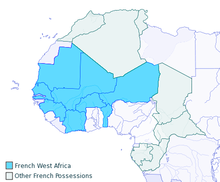West African Federation Fédération ouest-africaine (French) | |||||||||||||
|---|---|---|---|---|---|---|---|---|---|---|---|---|---|
| 1959–1960 | |||||||||||||
| Motto: Un Peuple, Un But, Une Foi | |||||||||||||
| Anthem: National Anthem of The Mali Federation | |||||||||||||
 | |||||||||||||
| Status | Territory of France (1959–1960) | ||||||||||||
| Capital | Dakar | ||||||||||||
| Common languages | Arabic, French | ||||||||||||
| Government | Federal republic within French Community (until 20 June 1960) | ||||||||||||
| High Commissioner | |||||||||||||
• 1959–1960 | Jean Charles Sicurani | ||||||||||||
| Premier and President (after 20 June 1960) | |||||||||||||
• 1959–1960 | Modibo Keïta | ||||||||||||
| Vice Premier | |||||||||||||
• 1959–1960 | Mamadou Dia | ||||||||||||
| Legislature | Federal assembly[1] | ||||||||||||
| Historical era | Decolonization of Africa | ||||||||||||
| 4 April 1959 | |||||||||||||
| 20 June 1960 | |||||||||||||
| 20 August 1960[2] | |||||||||||||
| Currency | CFA franc | ||||||||||||
| |||||||||||||
| Today part of | Mali Senegal | ||||||||||||

The Mali Federation (Arabic: اتحاد مالي) was a federation in West Africa linking the French colonies of Senegal and the Sudanese Republic (or French Sudan) for two months in 1960.[2] It was founded on 4 April 1959 as a territory with self-rule within the French Community and became independent after negotiations with France on 20 June 1960. Two months later, on 19 August 1960, the Sudanese Republic leaders in the Mali Federation mobilized the army, and Senegal leaders in the federation retaliated by mobilizing the gendarmerie (national police); this resulted in a tense stand-off, and led to the withdrawal from the federation by Senegal the next day. The Sudanese Republic officials resisted this dissolution, cut off diplomatic relations with Senegal, and defiantly changed the name of their country to Mali. For the brief existence of the Mali Federation, the premier was Modibo Keïta, who would later become the first President of Mali, and its government was based in Dakar, the eventual capital of Senegal.
Etymology
editThe name of the Central African Republic is derived from the country's geographical location in the central region of Africa and its republican form of government. From 1976 to 1979, the country was known as the Central African Empire.
During the colonial era, the country's name was Ubangi-Shari (French: Oubangui-Chari), a name derived from two major rivers and Central African waterways – Ubangi and Chari. Barthélemy Boganda, the country's first prime minister, favored the name "Central African Republic" over Ubangi-Shari, reportedly because he envisioned a larger union of countries in Central Africa.
History
editEarly history
editLorem ipsum dolor sit amet, consectetur adipiscing elit, sed do eiusmod tempor incididunt ut labore et dolore magna aliqua. Ut enim ad minim veniam, quis nostrud exercitation ullamco laboris nisi ut aliquip ex ea commodo consequat. Duis aute irure dolor in reprehenderit in voluptate velit esse cillum dolore eu fugiat nulla pariatur. Excepteur sint occaecat cupidatat non proident, sunt in culpa qui officia deserunt mollit anim id est laborum.
- ^ World Trade Information Service 1960.
- ^ a b Hodgkin & Morgenthau 1964, p. 243.


